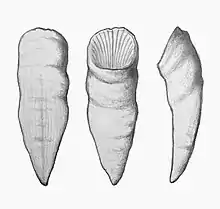Holophragma
Holophragma is an extinct genus of rugose coral known from Ordovician and Silurian rocks in Scandinavia, Russia, Australia and the United States.[1] Two of its species can be found on the northwestern coast of Gotland, where it is one of the most common fossil genera.[2] It was described by Gustaf Lindström in the year 1896.[3] The genus contains two species.
| Holophragma | |
|---|---|
 | |
| The species Holophragma calceoloides. | |
| Scientific classification | |
| Kingdom: | |
| Phylum: | |
| Class: | |
| Order: | |
| Family: | †Lykophyllidae |
| Genus: | †Holophragma Lindström, 1896 |
| Species | |
Description
Members of the Holophraga genus are small shoe or horn-shaped corals. They usually lived on their side, with their calyx pointing upwards. H.calceoloides has a distinct cardinal septa, while H.mitrata does not.
Species
- Holophragma calceoloides Lindström, 1866
- Holophragma mitrata Schlotheim, 1820
References
- "Holophragma". Fossilworks. Retrieved 2019-06-06.
- Sunstones and catskulls. Guide to the Fossils and geology of Gotland. Sara Elison. s.64. 2000
- "Holophragma". Fossiilid.info. Retrieved 2019-06-06.
This article is issued from Wikipedia. The text is licensed under Creative Commons - Attribution - Sharealike. Additional terms may apply for the media files.